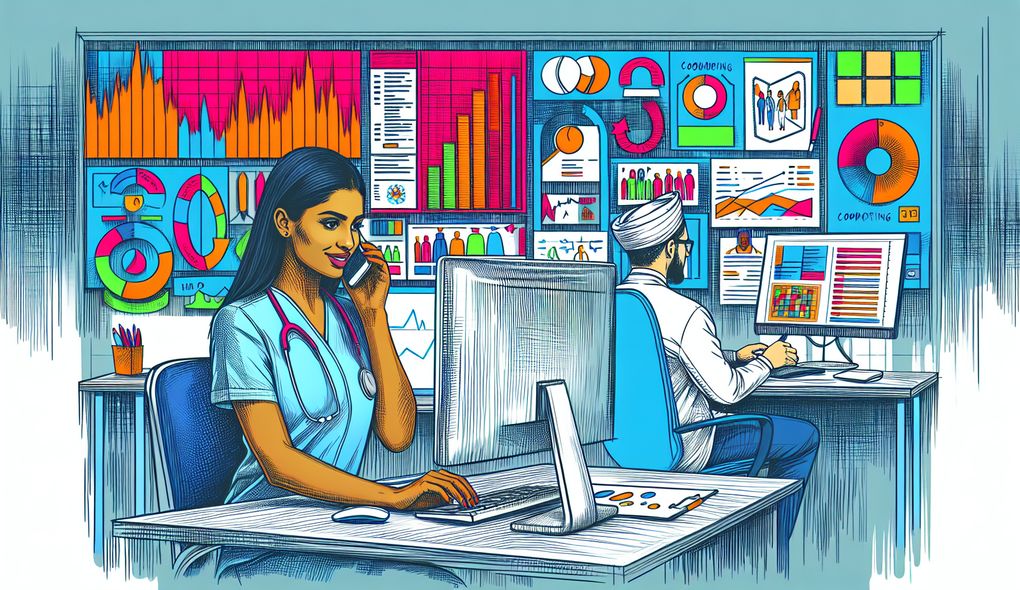How would you approach analyzing healthcare data to identify trends and areas for improvement?
INTERMEDIATE LEVEL

Sample answer to the question:
When approaching the analysis of healthcare data to identify trends and areas for improvement, I would first start by gathering the relevant data from various sources such as Electronic Health Records (EHR) systems, billing systems, and patient surveys. Then, I would clean and organize the data using Excel and other data analysis tools. Once the data is ready, I would use statistical methods and data visualization techniques to identify patterns and trends. Additionally, I would conduct comparative analyses to benchmark performance and identify areas for improvement. To ensure accuracy and reliability, I would validate the findings with clinical and administrative staff. Finally, I would compile my findings into detailed reports and present them to senior management, highlighting actionable recommendations for operational improvements.
Here is a more solid answer:
In my role as a Healthcare Operations Analyst, I would approach analyzing healthcare data by first understanding the specific goals and objectives of the analysis. This would involve collaborating with clinical and administrative staff to gain insights into the operational challenges and areas for improvement. Once the objectives are clear, I would gather the relevant data from multiple sources, including EHR systems, billing systems, and patient feedback. To ensure data accuracy and reliability, I would use advanced Excel functions and SQL queries to clean, organize, and analyze the data. I would also employ data visualization techniques to effectively present the findings to both technical and non-technical stakeholders. Throughout the analysis process, I would leverage my knowledge of healthcare delivery and management practices to interpret the data in context. If any anomalies or discrepancies are identified, I would use my problem-solving skills to investigate the root causes and propose potential solutions. Finally, I would prepare comprehensive reports that outline the trends, insights, and actionable recommendations for operational improvements and present them to senior management.
Why is this a more solid answer?
The solid answer provides more specific details about how the candidate would approach analyzing healthcare data, highlighting their experience, skills, and relevant knowledge. The answer demonstrates their proficiency in the required evaluation areas and aligns with the job description. However, it can be further improved by adding more specific examples and outcomes of past projects.
An example of a exceptional answer:
When analyzing healthcare data to identify trends and areas for improvement, I would adopt a comprehensive approach that combines data analysis, collaboration, and continuous improvement. Firstly, I would collaborate with clinical and administrative staff to understand their perspectives and goals. By involving stakeholders from various departments, we can gain a comprehensive understanding of the healthcare delivery system. This collaboration would continue throughout the analysis process, with regular feedback sessions and input from subject matter experts. Secondly, I would utilize a variety of data analysis techniques, including statistical analysis, predictive modeling, and machine learning algorithms, to identify trends and patterns in the data. These techniques would allow me to uncover hidden insights and potential opportunities for improvement. Furthermore, I would leverage my knowledge of healthcare delivery and management practices to interpret the data in a meaningful context. Thirdly, I would ensure the accuracy and reliability of the analysis by applying rigorous validation techniques, including data verification and sensitivity analysis. By validating the findings, I can confidently present the results to senior management and other stakeholders. Additionally, I would use data visualization tools to create interactive dashboards and reports that provide a comprehensive view of the trends and areas for improvement. Finally, I would continuously monitor the effectiveness of implemented improvements and make adjustments as necessary. By regularly measuring and tracking key performance indicators, I can ensure that the identified trends and areas for improvement are resulting in tangible outcomes. Overall, my approach to analyzing healthcare data is rooted in collaboration, data-driven insights, and continuous improvement.
Why is this an exceptional answer?
The exceptional answer demonstrates a comprehensive and strategic approach to analyzing healthcare data. It highlights the candidate's ability to collaborate with stakeholders, utilize advanced data analysis techniques, and implement continuous improvement strategies. The answer also emphasizes the candidate's knowledge of healthcare delivery and management practices, aligning with the job description requirements. However, to further enhance the answer, the candidate can provide specific examples of past projects where they successfully applied these approaches and achieved measurable improvements.
How to prepare for this question:
- Familiarize yourself with healthcare delivery and management practices, including key terminology and industry trends.
- Develop proficiency in data analysis tools such as Excel, SQL, and data visualization software.
- Gain hands-on experience with healthcare data by working on real-world projects or conducting independent analyses.
- Demonstrate your analytical and problem-solving skills by sharing examples of how you have identified trends and areas for improvement in previous roles.
- Highlight your ability to collaborate and work in cross-functional teams, as this is an important aspect of the role.
- Prepare to discuss how you have used data to drive decision-making and the impact it had on operational improvements.
- Be ready to showcase your attention to detail by explaining how you ensure data accuracy and reliability in your analyses.
- Practice presenting complex data findings in a clear and concise manner to both technical and non-technical stakeholders.
What are interviewers evaluating with this question?
- Analytical and critical thinking
- Data analysis and visualization
- Proficiency in Excel and other data analysis tools
- Knowledge of SQL and database management
- Understanding of healthcare delivery and management practices
- Problem-solving
- Attention to detail
- Collaboration and teamwork

